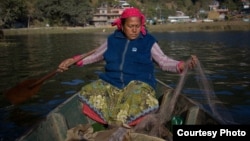Nearly 40 million people worldwide are directly employed in the fishing industry. Of these, half are women. “Women represent more than 50 percent of the workforce when it comes to fisheries,” said Gillian Caldwell, U.S. Agency for International Development Deputy Assistant Administrator and Chief Climate Officer.
“So women must have a seat at the table. They must be insured the microphone. And they really ought to be shaping the policies and the practices when it comes to sustainable fishing around the world,” she said.
But despite the fact that “women are critical to a sustainable blue economy and to sustainable fishing,” said Deputy Assistant Administrator Caldwell, “in many places around the world, women face discrimination. They face societal bias.” Indeed, according to a recent USAID report, “in the fisheries sector, structural inequalities and harmful social norms put women and girls in vulnerable situations, where they may be affected by and exposed to violence and abuse.”
That is why USAID is working to empower women in the fishing industry, she said.
“USAID is working to ensure that women, their voice and their power and their agency is really included in dialogs around fisheries and fisheries management because they are involved in every step of the supply chain, whether it's actually catching the fish, managing the fish, processing the fish or selling the fish. And they're so critical to ensuring the sustainability of fisheries.”
Since women represent such a high percentage of the fisheries workforce, the fishing industry affords a significant opportunity for women’s economic and social empowerment. At the 2024 Our Ocean Conference, which took place in Athens, Greece in mid-April, USAID pledged to invest a substantial sum of money tin support of women fishers.
“We have pledged more than $800,000 in new funding to support women and their engagement in sustainable fisheries, to increase their livelihoods and their power and their ability to support their families,” said Deputy Assistant Administrator Caldwell.
And of course, it's critical that they make a decent wage for their work, she said.
“A key part of USAID's programing is to ensure the power and voice and strength of women … fisher[s] in the industry so that they can ensure their own livelihoods and the livelihoods of their families.”














